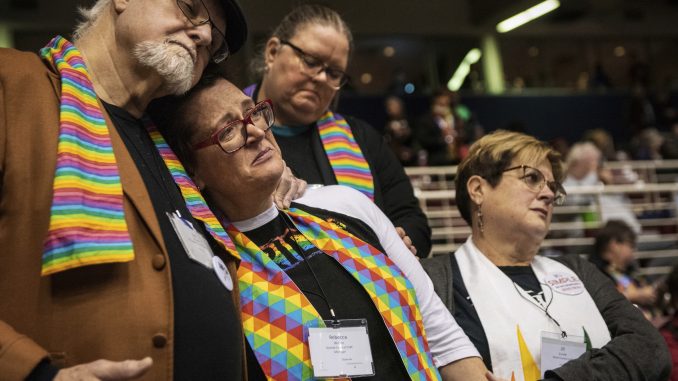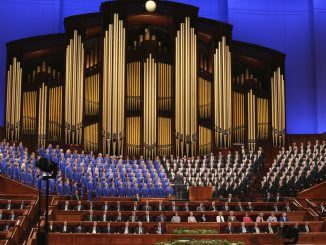
RALEIGH — In the final days of 2019, key leaders of the United Methodist Church released a proposal laying out the details of a solution to the denomination’s long battle over how to define their doctrines around issues of human sexuality.
The plan, titled “Protocol of Reconciliation & Grace Through Separation,” is subject to approval by the church’s general conference but is considered likely to pass because of the key leaders who were involved in drafting it. In prior general conferences, progressive groups within the church, like Affirmation and the Reconciling Ministries Network, sponsored one set of plans, and traditional groups, like the Wesleyan Covenant Association and the leaders of the growing African church, sponsored opposing ones.
After a very contentious 2019 General Conference in St. Louis, where the doctrine surrounding gay marriage and clergy was the main focus, leaders of both progressive and traditionalist groups agreed it would be difficult to continue as one “united” United Methodist Church.
“It became clear that the line in the sand had turned into a canyon,” New York Conference Bishop Thomas Bickerton said in a release on the church’s official news source. “The impasse is such that we have come to the realization that we just can’t stay that way any longer.
Along with bishops of major dioceses in the United States, like Florida, Washington and New York, bishops from Asia, Africa and Europe were part of drafting the new plan, as were representatives of the main traditionalist and progressive organizations that have fought over social issues in the church for decades. An African bishop, John Yambasu of Sierra Leone, initiated the negotiations.
This agreement was reached by using an experienced mediator, Kenneth Feinberg, who has experience working out high-profile disputes, including with the 9/11 Victim Compensation Fund and on Catholic sex abuse payouts for major dioceses.
Over months in mediation with Feinberg, all sides agreed that, due to the unlikelihood of reaching any agreement on gay marriage and ministry, the best thing was to allow the traditionalists to exit amicably into a new denomination.
The new denomination would receive $25 million from the UMC, and all congregations would have four years to decide whether to leave to join the new denomination or to stay in the UMC. Conferences overseas would also have the choice to remain in the UMC or to join the new traditionalist denomination. Those leaving would keep their church properties and pensions.
“The proposal is the outcome of a skillfully mediated process in which these leaders came to a unanimous sense of possibility for our future,” North Carolina Conference Bishop Hope Morgan Ward, who oversees the eastern half of the state, said in a statement. “Styled by some media as a split, all the participants understand this to be a continuity of the UMC with provisions for separation for those who desire to do so.”
Ward’s statement also made sure to clarify that, “As with all proposals and petitions, General Conference is the place where any decision will be made.”
Bishop Paul Leeland, who oversees the Western North Carolina Conference, made similar statements, saying the agreement is a “separation” not a split, and that, until it is voted on at the May 5, 2020, General Conference in Minneapolis, it is only a proposal.
“While I have not addressed each of the details proposed in the agreement, I have refrained from doing so knowing that this will be the work of our General Conference,” Leeland said in a press statement.
One young UMC pastor from the Triangle area, who wished to remain anonymous, said he had several young adults from his congregation reach out, wanting to get together to discuss what it means that the denomination is splitting. Agreeing with the North Carolina bishops, he doesn’t see it as a split, but as the traditionalists deciding to start something new.
“I read it as a minority wants to leave the denomination. I have a little bit of frustration that everybody, The New York Times, NPR, everybody, is naming it as a split. The fact that the UMC name is going to remain makes it feel less like a split to me.”
The pastor leads what he calls a “purple congregation” that has people of all different political and social views. He said he believed Methodists were generally moderate and accepting people, and despite individual members’ disagreements on gun control and gay rights, they could still meet in unity at the communion table.
“I like the U in front of the UMC. We were in a world that was united even though we didn’t agree on everything,” he said.
One issue that both progressive and traditionalist clergy expressed in interviews with NSJ was that while the congregations are fairly evenly split, the clergy leans more progressive.
“I think there’s going to be a shortage of pastors in the new denomination,” the pastor said. “I think there are going to be a lot of congregations that will say, ‘Let’s join the new denomination,’ but then the pastor will say, ‘If you guys take this road, I’m not in good conscience going to be able to be your pastor anymore.’”
He said he knew progressive clergy with traditionalist congregations who are in this exact situation. This could mean larger churches with fewer clergy for the new traditionalist denomination and small congregations with many clergy in the more progressive UMC.
The process of separation will likely be messy, according to clergy on all sides, but, even though the vote hasn’t been taken, they are predicting the plan will pass and the church will split.
“I actually do think the proposal is going to pass,” the young pastor said. “I think there’s enough people on both sides who want it to happen. I have traditional friends who are pastors who are more than out the door. Then I have progressive-leaning friends, even trans and gay clergy, that are saying, no more breadcrumbs. We want to be able to be fully ordained and want to do LGBTQ weddings.”



